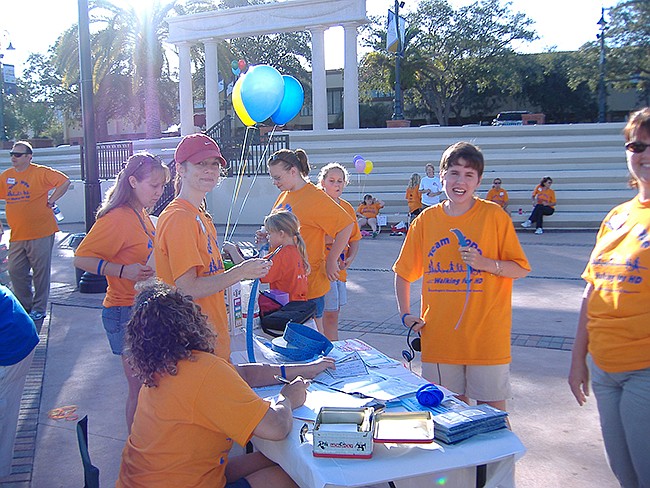- April 25, 2024
-
-
Loading

Loading

She runs during her lunch breaks, 15 miles per week — no exceptions. But she loves it. Unlike many avid runners though, Winter Park resident Karen Milek doesn't listen to music when she runs; the runner's high is enough. She bikes to work at the FedEx office near her home and adamantly eats plenty of blueberries.
Milek suffers from Huntington's disease, a rare degenerative brain disease. Every weekend, she used to take a friend who also had the disease to the movies — but now, her friend is too sick to leave the house.
"I've got to keep doing it — because it's saving my life. I want to live 100 percent or be gone," she said. "Running is when I meditate. It clears my head. I think of things and problem solve."
Since testing positive for the mutated gene that causes Huntington's nearly 20 years ago when her mother was diagnosed with it, Milek's natural zeal for life, surprisingly, has gone anywhere but down, despite the onset of her occasional falls, jerky movements and, at times, off-balance gait.
The disease gradually destroys brain cells, causing psychiatric, cognitive and motor disorders. Most of Milek's family is afflicted by it. In February, she lost her sister, Brenda Burris, to the disease. Two weeks ago, she lost her uncle to it. And in years past, her mother and aunt.
It's characterized by involuntary, jerky movements called chorea — from the Greek word for 'dance' — and comes along with fixation on certain thoughts, trouble walking, thinking or focusing, mood disorders and impulsive behavior. If a parent carries the mutated gene that causes Huntington's disease, children have a 50 percent chance of having it themselves, and symptoms usually begin to manifest between 30 and 45 years of age, according to the World Health Organization.
With no cure for the illness, 30,000 people in the U.S. are living with it, according to Huntington's Disease Society of America. Milek has been harnessing her strength in the midst of grief to spread awareness of the illness, helping to raise thousands of dollars with her family members by running marathons and triathlons, and flying as far as London for fundraisers and research studies.
The HDSA Team Hope Walk is from 9 to 11 a.m. Sept. 19 at Crane's Roost Park in Altamonte Springs. Check in is from 8:30 to 9 a.m. Registration cutoff is 4 p.m. Sept. 18. Visit hdsa.donordrive.com for more information or call Leslie Fisk at 407-492-3440.
"I feel that everyone has a purpose, and this is mine," Milek said. Her efforts are currently focused on the upcoming Huntington's Disease Society of America Team Hope Walk, to be held at Crane's Roost Park in Altamonte Springs on Sept. 19. The walk's fundraiser website has raised more than $11,000 as of this week.
"I don't know what she was before the disease," said Milek’s niece Emma Burris, 18, whose mother died of the disease. "She was bipolar, emotional, angry all the time — I thought it was all my fault."
Emma had to grow up fast. Instead of coming home and working on homework or inviting friends over after school, she took care of her mother, attempting to calm her down whenever she plunged into the trough of a sudden mood swing. She knew it was just the disease speaking, not her mother, when she would randomly yell or scream, but it still hurt. At only 10 years old, she would make baked ziti or taco dinners for her mother — though her mother often refused to eat them because of fixation on other foods.
"It was like I was the parent and she was the child. She couldn't do stuff on her own," said Emma, who doesn't have the disease herself; she’s adopted. Emma joined her mother in organizing fundraisers — Brenda had helped Milek put on several events, like basketball tournaments, when she was well enough. Emma remembered going door to door with her as a little girl, asking for donations for the latest fundraiser her mother was working on.
As a teen, she coped with her turbulent home life by writing songs and performing them at HDSA's National Youth Alliance talent shows. Before her death, Brenda tattooed a line from her daughter's song on her left arm: "We're almost at the end of the tunnel," words enrobed by an inked cross and a ribbon. Despite all the adversities, her mother was still Emma's best friend.
For Milek's other sister, Pam Stewart, 57, onset of the disease began with issues at work and having trouble following directions, once taking home an office phone that her former boss said was not to be removed from the workplace.
"It was a double whammy from Huntington's and the world," Stewart said. But after that incident, Stewart's psychological symptoms only worsened. Obsessive-compulsive disorder and severe depression ruled her mind, causing her to make more than one suicide attempt. She's now tied to an astutely scheduled life in an Oviedo assisted living facility. Medications help with the disorders, but she's unable to drive or independently take care of herself.
"It's not just about raising money," Stewart said about the HDSA walk. "It's awareness. There are still families out there who are isolated, ashamed of this disease."
Having throughout her life witnessed firsthand the effects of Huntington's disease on her whole family, Emma wants to help better the lives of those touched by it by going to school to be a nurse and continuing to help with HDSA's walks and fundraisers.
"Everyone who is touched by this disease instantly becomes family … Instead of walking away from it all, I want to build on it. I just love everyone so much," she said, putting a hand to her chest. "We have nowhere to go but up. I don't think I can give up if I tried."